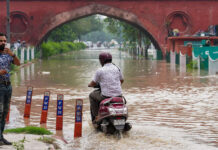As kids, we all are taught that 97% of earth’s water lies in the oceans and measly 3% is available in the freshwater form. But, even with such a large percentage of ocean water with us, less than half of the human population has access to potable water.
Presently, around 2.5 billion people live in the water-stressed areas and the number is likely to go up by 2025. An easy solution for the water adversity by any technologically-naïve person would be to desalinate ocean water.

So, why are we not meeting up water shortages by installing desalination plants all over the globe?
Yes, it’s a seemingly fitting answer to the water crisis. But, the desalination technology that the world is currently using suffers from two significant drawbacks- Cost and Environmental hazards. Let’s dive in and get to the bottom of it!
Economically Impractical
We are going to start with some chemistry here before coming on to numbers. Salt is easily dissolvable in the water and thanks to strong chemical bonding; it takes a lot of energy to separate salt from water! Now, it’s hard to put an exact figure on desalination, but the cost of water plants and energy sources needed to convert seawater into freshwater is quite hefty!
The cost again depends on many factors such as labor, land prices, the salt content of the water, and yet the output is still low. As it’s always cheaper to use local freshwater, the environmentalists stress on building water reservoirs. Harvested water can then transfer to the mega-scale desalination plants.
 As of now, there are around 15,000-20,000 water desalination factories in the world which process 55.6 billion liters of drinkable water on daily basis. Most of these plants are based in arid but energy-rich countries like Saudi Arabia which can use thermal distillation to filter saline water. But, as world is already running out of the renewable energy sources, the thermal distillation is not feasible in the long term.
As of now, there are around 15,000-20,000 water desalination factories in the world which process 55.6 billion liters of drinkable water on daily basis. Most of these plants are based in arid but energy-rich countries like Saudi Arabia which can use thermal distillation to filter saline water. But, as world is already running out of the renewable energy sources, the thermal distillation is not feasible in the long term.
However, many energy-efficient plants such as one in Tampa (Florida, USA) are innovating eco-friendly technologies to meet the needs of both the people and nature. They are focusing on reverse osmosis that forces salt out of water when its passed through a semi-permeable layer. But, even reverse osmosis filtration at large scale has its limitations as the production is again low and would only cover the drinking water shortage.
For heavily water-dependent purposes such as agriculture, Reverse Osmosis plants would again drive up the cost and thus, are not economically viable.
The Environment Fallout
The existent methods for desalination are not only ineffective when it comes to production value but also puts pressure on current conservation efforts. Sealife would get majorly affected by desalination plants. Firstly, when getting water from oceans, creatures like baby fish and plankton could get sucked up in the plants. This will imbalance the marine food ecosystem, and humans too will be affected in remote future.

Secondly, the problem with filtered out brine is where to dump it. If the highly concentrated salt water is let into the water bodies, it will kill the aquatic life by creating an oxygen deficiency in the water.
We have gone miles when it comes to technological advancements, but why has no one still found a sustainable way to desalinate seawater? We are not saying that desalination plants are an utter failure, but we need more energy and cost-effective advancements to overcome global water scarcity.
With each passing year, the earth is going dry of freshwater resources and global warming is increasing seawater levels. Either way, the world is racing towards inevitable doom. There has to be a middle ground that would not only use our existent water resources more efficiently but also save other energy sources the earth.
















































